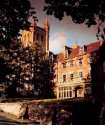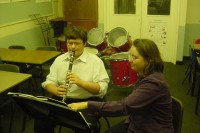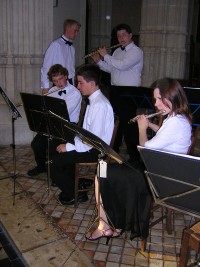A parents’ guide to the instrumental
music provision at
Bristol Cathedral School
Instrumental playing is an important aspect of the
wide range of musical opportunities and experiences
that exist at Bristol Cathedral School. Because of the
finite nature of time and resources, we cannot unfortunately
make the provision available to everybody. It is very
much an ‘extra’ – an enhancement
of the general, curricular provision, but one which
we try to make available to as many suitable students
as possible.
Application for Lessons
This should be made on the appropriate form, a copy
of which is available from the school.
Selection of Students
In beginners, we look for an adequate musical ear,
physical suitability to the instrument and some evidence
of enthusiasm and commitment. Priority is given to
students who have already begun to learn and are progressing
well.
Loan of Instruments
The school has a limited number of instruments which
can be loaned to students. They are
loaned on the understanding that running repairs – the
provision of reeds, strings, etc. – are the responsibility
of the student as is also the safe keeping of the instrument.
When it is clear that the students have settled to
the instrument and are making good progress, we hope
that they will acquire their own instrument.
Lesson Organisation
Students usually receive one 35 minute lesson each week.
Lessons are organised on a withdrawal basis and although
this means missing other lessons, instrumental lesson
times rotate – usually across a full day – in
order to minimise disruption. Students are, of course,
required to make up any work they miss. Once a student
is accepted for tuition, the instrumental lesson must
be the priority except in very exceptional circumstances.
Likely absence from a lesson should be notified to Mr.
Seymour in advance.
Theory Lessons
When students are ready to progress to the higher
practical  grades
for which a theory qualification is required, tuition
for this is provided. This has to take place outside
the normal framework of lessons in the working day
and is provided in pre-school sessions beginning at
8.30am. grades
for which a theory qualification is required, tuition
for this is provided. This has to take place outside
the normal framework of lessons in the working day
and is provided in pre-school sessions beginning at
8.30am.
Ensemble Playing
 This
is an important aspect of performance which develops
skills quite different from, but complementary to,
solo playing. It is therefore expected that, as soon
as we consider students ready to join one of the ensembles,
this training becomes part of their musical experience
with us. Such involvement then becomes a condition
of continuing tuition. This
is an important aspect of performance which develops
skills quite different from, but complementary to,
solo playing. It is therefore expected that, as soon
as we consider students ready to join one of the ensembles,
this training becomes part of their musical experience
with us. Such involvement then becomes a condition
of continuing tuition.
Practice and Progress
Regular practice is absolutely vital,
and parents are asked to ensure that half an hour is
undertaken each day – little and often is the
golden rule here. Each student will be given a record
card which will be completed weekly.
Continuation or Cessation
of Lessons
Once accepted for tuition, students will normally
continue to have this provision but this will be dependent
upon satisfactory effort and progress being achieved
and recorded each week. If for any reason a student
wishes to be withdrawn from lessons, half a term’s
written notice is required.
Examinations
 When students are considered ready, they will be prepared
for the graded examinations of the Associated Board
of the Royal Schools of Music. Entry fees are paid
by the student. Older students learning instruments
in school will also be helped with the preparation
of the practical elements of G.C.S.E. and A-level examinations. When students are considered ready, they will be prepared
for the graded examinations of the Associated Board
of the Royal Schools of Music. Entry fees are paid
by the student. Older students learning instruments
in school will also be helped with the preparation
of the practical elements of G.C.S.E. and A-level examinations.
|






 grades
for which a theory qualification is required, tuition
for this is provided. This has to take place outside
the normal framework of lessons in the working day
and is provided in pre-school sessions beginning at
8.30am.
grades
for which a theory qualification is required, tuition
for this is provided. This has to take place outside
the normal framework of lessons in the working day
and is provided in pre-school sessions beginning at
8.30am.  This
is an important aspect of performance which develops
skills quite different from, but complementary to,
solo playing. It is therefore expected that, as soon
as we consider students ready to join one of the ensembles,
this training becomes part of their musical experience
with us. Such involvement then becomes a condition
of continuing tuition.
This
is an important aspect of performance which develops
skills quite different from, but complementary to,
solo playing. It is therefore expected that, as soon
as we consider students ready to join one of the ensembles,
this training becomes part of their musical experience
with us. Such involvement then becomes a condition
of continuing tuition.  When students are considered ready, they will be prepared
for the graded examinations of the Associated Board
of the Royal Schools of Music. Entry fees are paid
by the student. Older students learning instruments
in school will also be helped with the preparation
of the practical elements of G.C.S.E. and A-level examinations.
When students are considered ready, they will be prepared
for the graded examinations of the Associated Board
of the Royal Schools of Music. Entry fees are paid
by the student. Older students learning instruments
in school will also be helped with the preparation
of the practical elements of G.C.S.E. and A-level examinations.